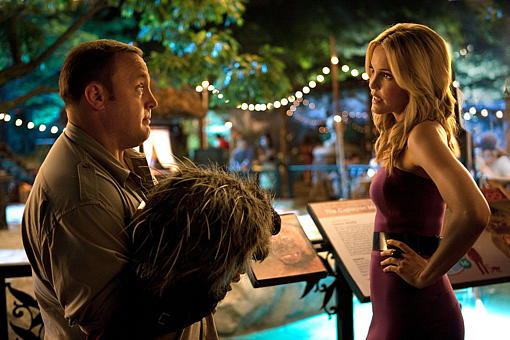By Sunny Choi · July 11, 2011

In Zookeeper, Griffin Keyes (Kevin James) is a pathetic, schlubby, insecure zookeeper who has developed a slight post-traumatic stress disorder after his shallow girlfriend, Stephanie (Leslie Bibb), rejects his carefully planned marriage proposal because she considers his occupation too lowly to satisfy her luxurious palate. (Once again, our younger audiences are exposed to the all too familiar gold-digging female archetype). At least Griffin has a heart of gold, filled with compassion and love for the zoo animals (a good message for the mini-kids), but his tendency to brood over his “ugly” past prevents him from finding true love. So obviously, the poor guy needs some help.
So as a call to loyalty, the zoo animals decide to help their seriously diffident caretaker by breaking the code of silence and actually speak to him in an attempt to squeeze out the animalistic, masculine confidence essential to wooing his ex-girlfriend, who reappears after five years at his brother’s wedding. And, as you can imagine, this is where the so-called animal hilarity begins. Because everybody knows pairing up overweight (and over-rated) comedians with talking animals is comedy gold. So they say.
Despite the ridiculous premise (and the fact that I don’t particularly find anything funny about talking animals), I still found myself sympathizing with Griffin, the awkwardly likable protagonist, because not only has he been stepped on like an unwanted insect by a money hungry black widow of an ex-girlfriend, more importantly, he treats the zoo’s animals with genuine concern and respect. To Griffin, the animals come first. He goes to great tripping lengths to install a tire swing to cheer up the depressed gorilla, Bernie (Nick Nolte). He also works wonders as a matchmaker for the two lions. But although, the film demonstrates a love and commitment to animals, ultimately, Zookeeper misses the mark.
Now I understand that this is supposed to be fluffy family fun. And I get that the talking animal thing can be a financial home run for studios. Eddie Murphy’s Dr. Doolittle and Dr. Doolittle 2 proved the gimmick has legs. But just because it can work doesn’t mean that it always will. The main two problems with Zookeeper rest with forced plot devices and underdeveloped female characters.
The first major plot problem arises when Kate the veterinarian (Rosario Dawson) becomes a potential love interest only after Griffin uses her as a fake date to his brother’s wedding. They genuinely start enjoying each other’s company, but their blooming relationship is formidably forced when they somehow find long white silk ribbons to swing on and recreate a merry-go-around on the dance floor. (Seriously, that happened.)
Moreover, Kate is presented as a two-dimensional character with absolutely no backstory and appallingly low standards. I understand the suspension of disbelief and the surreal world of talking animals, but still we must believe the characters would actually do what they do in their world. And unfortunately, it’s completely unrealistic that Kate, who has such wonderful career prospects and self-assuredness (come on, she’s in demand as a veterinarian in Nairobi!) would go for an insecure, petty, zookeeper who is using her to arouse his shallow girlfriend’s jealousy. This may boost the egos of some unsuccessful men but actually disparages successful, intelligent women who want to find emotionally stable, honest, and smart companions.
Also adding to this underlying sexist vibe are the animals persuading Griffin to mistreat Stephanie to leave her wanting more. And guess what? She finds his new jerk persona to be so attractive. Although this may have been a poor sociological attempt at illustrating women’s predilection for “bad boys,” I found this an insulting and inappropriate message to impart to our young women. The fact that both female characters fall for such an inept man indirectly reinforces the idea that women, as marginalized and subordinate members of society, are supposed to settle for substandard, not so wonderful, men.
The plot turns unbelievable once more when after Griffin wins the heart of the snobby Stephanie, he emerges as a stellar Ferrari and Mercedes salesman from the get-go. In order to truly find fulfillment, Griffin must dabble in the yuppie life that Stephanie demands before realizing that such a compromise kills his soul by stifling his passion and ruins any chances of running his own life. And this is yet another example of connecting the formulaic genre dots… and then, and then, and then.
However, I still applaud the heartwarming bond that Griffin strikes with his four-legged friends, especially with Bernie the Gorilla. I was especially fond of the “guy’s night out” sequence, where Bernie, masquerading as a man in a gorilla costume, goes to TGI Friday’s, eats thirty oranges, flirts with the girls at the next table, and gazes at the stars with Griffin. Good times, and “I love you, man” moments, almost putting humans and animals on the same level, maybe even animals reaching a higher status.
But not all the animals were as impressive, often feeling more like stand-in scenery, including Maya Rudolph’s giraffe and Adam Sandler’s monkey (who sounded a bit like Louis Armstrong) affecting some sort of dialectic affectation to appeal to the urban market and showcase their street smarts, in stark contrast to their bumbling zookeeper. Joe the Lion (Sylvester Stallone) and Janet the Lionness (Cher) just cluttered up the story with the bickering subplot that didn’t seem to go anywhere, ultimately serving as annoying background noise instead of advancing and enhancing the film.
As a family movie, Zookeeper aims to instill good by embracing Griffin’s compassion for the animals and treating them with the kindness and respect. While that is an admirable message to impart, I still find it disturbing that the filmmakers chose contrived plot devices and stereotypical female characters over more developed characters in a plausible, believable story within this specialize world, talking animals included.